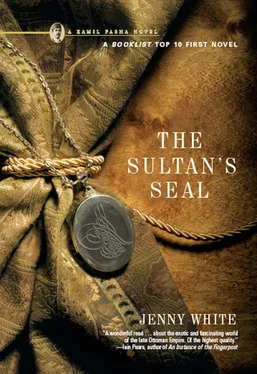Jenny White - The Sultan's seal
Здесь есть возможность читать онлайн «Jenny White - The Sultan's seal» весь текст электронной книги совершенно бесплатно (целиком полную версию без сокращений). В некоторых случаях можно слушать аудио, скачать через торрент в формате fb2 и присутствует краткое содержание. Жанр: Исторический детектив, на английском языке. Описание произведения, (предисловие) а так же отзывы посетителей доступны на портале библиотеки ЛибКат.
- Название:The Sultan's seal
- Автор:
- Жанр:
- Год:неизвестен
- ISBN:нет данных
- Рейтинг книги:5 / 5. Голосов: 1
-
Избранное:Добавить в избранное
- Отзывы:
-
Ваша оценка:
- 100
- 1
- 2
- 3
- 4
- 5
The Sultan's seal: краткое содержание, описание и аннотация
Предлагаем к чтению аннотацию, описание, краткое содержание или предисловие (зависит от того, что написал сам автор книги «The Sultan's seal»). Если вы не нашли необходимую информацию о книге — напишите в комментариях, мы постараемся отыскать её.
The Sultan's seal — читать онлайн бесплатно полную книгу (весь текст) целиком
Ниже представлен текст книги, разбитый по страницам. Система сохранения места последней прочитанной страницы, позволяет с удобством читать онлайн бесплатно книгу «The Sultan's seal», без необходимости каждый раз заново искать на чём Вы остановились. Поставьте закладку, и сможете в любой момент перейти на страницу, на которой закончили чтение.
Интервал:
Закладка:
“Not at all, Sybil Hanoum. You’ve been extremely helpful.”
She doesn’t look up.
“Please don’t worry yourself. You’re mistaken to think you are somehow unjust to Miss Dixon’s memory by telling me what you know of her. On the contrary, you are helping me sort out what I believe you English call a ‘fine kettle of fish.’”
Sybil laughs. “Your English really is remarkable.” Then, turning serious violet eyes on Kamil, still sitting with his back to the offending paintings, she ventures, “Could I entice you to stay for lunch?”
“I would be honored.”
Sybil calls the maid to give instructions, then, to Kamil’s great relief, leads the way out of the reception room.
“From whom did you inherit your discerning palate, then?”
A servant in a pressed black suit stands just inside the French doors, far enough away that he cannot hear their conversation, although Kamil sees the young man’s head straining their way. They sit on the patio, cooled by breezes from the Golden Horn.
“From my grandmother. Since my parents were abroad so much, my sister, Maitlin, and I lived with my grandmother in Essex. Nana was quite a bon vivant. She had the most fabulous dinner parties with coq au vin, flans, these delicate almond fingers…I can almost taste them now. You know, she hired a French cook for her kitchen. It was quite a radical thing to do, since the French were-and still are-quite unpopular. In fact, some of her kitchen staff quit because they refused to work under a “Frenchie.” But the cook, Monsieur Menard, was such an unassuming person that the staff eventually accepted him. His passion was cooking and he produced the most remarkable meals. Other people served stodgy English fare, but Nana’s dinners were always interesting. Not all of her guests approved, of course.” She laughs, exposing tiny round teeth. “I remember one particular lamb chop that was so tender that I can still, to this day, taste the bubble of flavor that burst in my mouth when I took the first bite.”
Sybil stops abruptly and leans forward, embarrassed. “You must think me trivial to be obsessing over a lamb chop when you are here on a matter of murder.”
“One’s past is never trivial. Your description made me think of the house I grew up in, my mother’s house in Bahchekoy. I still live there.” Sybil’s vivid account of her grandmother’s house has pulled him into a conspiracy of memories from which he doesn’t have the will or the desire to disentangle himself.
“My father was governor of Istanbul, and he was also responsible for the police and the gendarmes, so he was busy much of the time. Even when he was at home, we rarely saw him. The governor’s palace was enormous, with so many rooms always crowded with servants and guests and people coming to petition my father or pay social visits to my mother as the governor’s wife. I think it was all a bit too much for her. So when we were still quite young, she moved my sister and me to her childhood home. It’s a lovely villa, surrounded by gardens. You can see the Bosphorus from the gardens. And instead of your Monsieur Menard, we have Fatma and Karanfil,” he adds with a smile.
“Are they your relations?”
“No, they’re local women who cook for the household. Fatma lived in the cook’s quarters that were behind the house then, at the back of the yard. She never married. Her sister Karanfil came in the morning and then returned to her own home. Her husband was a water carrier.”
He remembers them as they appeared in his childhood, two short, round women, their baggy, brightly flowered shalwar trousers expanding upward to meet layers of brightly patterned sweaters and cardigans. Their faces are full moons, but set with disconcertingly delicate features, as if the women have different, slender selves that somehow have been mistakenly absorbed by their heavy bodies.
A powerful, sensual memory of the kitchen of his childhood floods him as he waits for Sybil to refill his water glass. He toys with the fried mullet on his plate.
The women were in continual motion, cooking and cleaning. In summer they brought their work into the yard. He has an image of Fatma, squatting beside a basin of soapy water, her powerful arms twisting a rope of wet laundry. In winter the blue-washed kitchen walls were festooned with ears of corn and strings of red peppers, pulsating with color. A ceramic water urn stood just inside the door, a tinned copper plate across the top to keep out dust. A copper mug rested on the plate. Kamil remembers lifting the plate and looking into the urn, which stood almost to his chest, the hollow quality of the air and the loamy smell of wet clay, the resistance of metal against the skin of water and the satisfying whirlpool entering his mug. Water directly from this urn always tasted like an entirely different substance than water drunk from a glass. To this day, he keeps a clay jar of water and a tinned mug on the dressing table in his bedroom. He drinks from it to clear his mind and calm his senses.
He sips from his glass. Sybil waits expectantly for him to continue, unwilling to break his reverie by prompting him.
He tries to describe the garden, the kitchen, the fresh, lightly spiced cuisine: roasted aubergines, chicken pounded with walnuts and sesame oil, tart grape leaves stuffed with savory rice mixed with currants. Fatma and Karanfil called him their little lamb and plied him with flaky cheese-filled pastries and sweet cakes, washed down with glasses of diluted sugary black tea. Through the crackle of fire and the slap of dough against wood, Fatma’s husky voice wove Turkish fables and legends and cautionary tales of djinns and demons.
“What happened to them?”
“Karanfil’s husband died in a fire and now she, her son Yakup, and Fatma live in an extension I had built onto the kitchen house after my mother died. With the help of a few other servants, they keep house. They cook for me and tend the garden and my plants.”
“You live there alone, then, with your servants.” A statement.
“Yes.”
This time, the silence is awkward. One word carries an insupportable burden, where an hour-long conversation has flown by with unguarded wings.
Sybil’s face and neck flush red. She motions brusquely to the servant waiting by the door and asks for tea to be served in the garden. She stands and leads Kamil to a table set beneath an incongruous palm tree.
“Tell me about your plants,” Sybil suggests in a voice too charged with interest.
“I have a small winter garden, I believe you call it. I collect orchids.”
“Orchids? How delightful! But how do you get them here? Aren’t they from South America? I’ve heard they’re quite delicate.”
“Not just from South America, Sybil Hanoum. There are many varieties of orchids all around us.”
“Here? In Turkey?”
“There is a lovely orchid with sprays of violet blooms that grows in the forests around Istanbul, Cephalanthera rubra. ” He smiles at her. “It is our connection to Europe, where this variety is also found.”
Sybil is flustered. “How lovely. Imagine my ignorance. But, but I would so like to see your collection,” she blurts out. She looks down to rearrange her skirts with exaggerated care. “I’m sorry. That would be inappropriate, of course.”
“It would be a great pleasure”-he pauses briefly-“but perhaps it would be better if your father accompanied you.” The sight of her crestfallen face dismays him, but he is unwilling to risk her reputation-or, he admits to himself, his privacy. Still, the image of Sybil bending appreciatively over his scented orchids has taken root in his mind.
Regarding Sybil over the rim of his cup, Kamil lets the warm, eggshell-thin china rest for a moment against his lower lip before he sips from it.
Читать дальшеИнтервал:
Закладка:
Похожие книги на «The Sultan's seal»
Представляем Вашему вниманию похожие книги на «The Sultan's seal» списком для выбора. Мы отобрали схожую по названию и смыслу литературу в надежде предоставить читателям больше вариантов отыскать новые, интересные, ещё непрочитанные произведения.
Обсуждение, отзывы о книге «The Sultan's seal» и просто собственные мнения читателей. Оставьте ваши комментарии, напишите, что Вы думаете о произведении, его смысле или главных героях. Укажите что конкретно понравилось, а что нет, и почему Вы так считаете.












